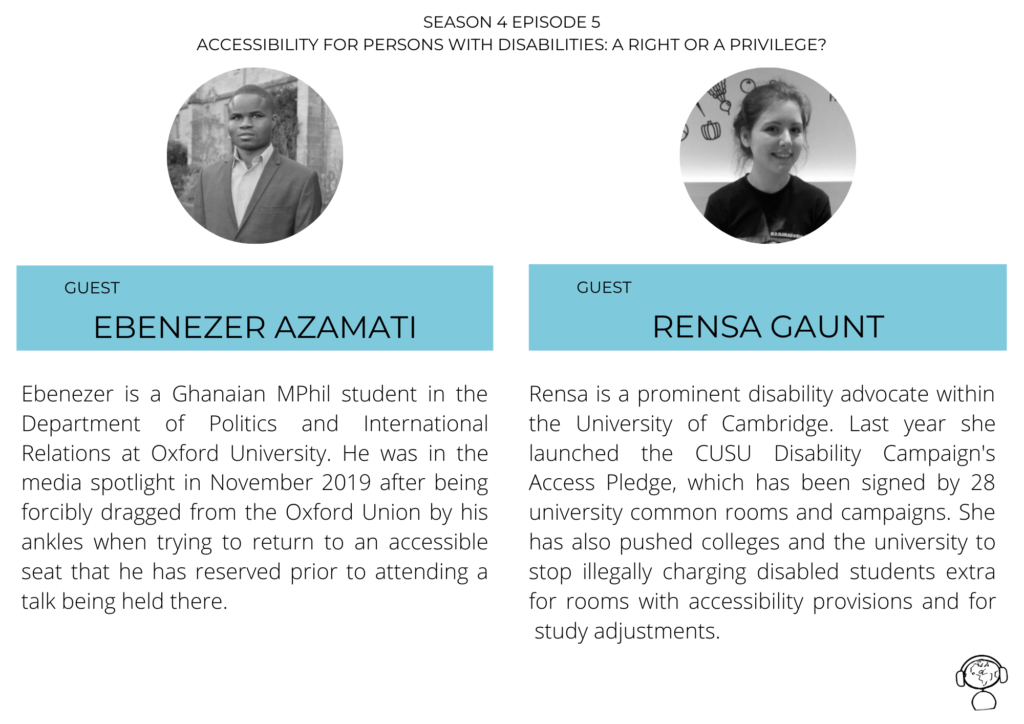In this episode, we discuss the provision and effectiveness of existing laws aimed to protect the rights of people with disabilities. We are joined by two guests, both students at British universities who have themselves experienced the marginalisation and discrimination that is imposed on persons with disabilities – sometimes unconsciously. The podcast touches on issues of positive discrimination, intersectionality and ‘invisible’ disabilities.
There are various legal frameworks in place that promote the full and equal enjoyment of all human rights for disabled people, and requires all institutions to make reasonable adjustments in order to grant those. These rights are outlined at the supranational level in the United Nations Convention on the Rights of Persons with Disabilities, and domestically within the UK’s Equality Act 2010. The importance of such documents is emphasized by Gerald, who explains that “issues of persons with disabilities appear to not be a priority for institutions, if not for the existence of laws”. This is partly due to a lack of awareness, as the discourse on disabilities is ironically often dominated by people who are not themselves disabled. It is also because institutions do not see the necessity of implementing provisions and adjustments for various disabilities before a disabled person requires it, without realising that this hinders many from ever making it to university in the first place.
Despite legal frameworks being in place, the sad reality is that many institutions are still reluctant to implement procedures or policies. The speakers point out that there exists an issue of priorities set within universities. Ideally, institutions should make anticipatory adjustments for students even before they arrive. However, since the government won’t and can’t enforce this, institutions only follow the law if they are threatened to be sued because they are disregarding it. Sadly, institutions count on the fact that this rarely ever happens. They are aware and take advantage of the fact that disabled students are unlikely to have the energy and resources to deal with a law case against the institutions discriminating them – on top of all the other challenges they are dealing with.
“And for the people who say, what if you get an undue advantage? If I’ve gone through a court case in order to be able to get a lift in a building, and the issue is that you think that I get an undue advantage, I think that is completely the wrong perspective and also just belittles how much time and energy is put into getting very simple things.”
Rensa Gaunt
The episode is special in the way that it gives a deep insight into the emotive every-day experiences of people with disabilities, and shows the listener why this is an issue that everyone should care about. The speakers point out that having a disability is not asked for – any person can become a disabled person at any point in time. Furthermore, they recount personal experiences to demonstrate the complexity of the issue at hand. First and foremost, each disability is different, and requires individual adjustments and provisions. Furthermore, students with disabilities are also dealing with a range of other identities, which often further increases their burden. For instance, Rensa explains that women’s pain conditions are often not taken serious and are consequently diagnosed too late.
“The blood that runs through our veins is the same as everyone else’s. It doesn’t take heaven and hell to meet the needs of disabled students”
Ebenezer Azamati
Where do we go from here? What needs to be done to change the attitude of institutions, and help people with disabilities enjoy the same rights as all of us? Recognising that not every disability is the same, and consequently providing help that is tailored to everyone’s needs, is a crucial first step. For that, Resna points to the importance of providing points of contact that are aware of the problems faced with people with disabilities, who will understand the individual problem and help to make adjustments. Appointing disability officers within the university, and each college, is one way to assure this. Furthermore, we must deconstruct the stereotypes that are associated with the term ‘disabled’. Not everyone disabled student, for instance is helpless and constantly needs our help. On the other hand, however, many forms of disability are invisible – such as mental illnesses – and shouldn’t be overlooked.
“It is the environment, not the condition, that makes us disabled”

Links for further information:
- UK Equality Act 2010 – https://www.gov.uk/guidance/equality-act-2010-guidance
- A summary of the UN Declaration on the Rights of Disabled Persons – https://www.britannica.com/topic/United-Nations-Declaration-on-the-Rights-of-Disabled-Persons
- Office for Students on the rights of disabled students – https://www.officeforstudents.org.uk/publications/beyond-the-bare-minimum-are-universities-and-colleges-doing-enough-for-disabled-students/
- The Guardian on disabled students – https://www.theguardian.com/education/2019/jan/17/universities-can-do-more-to-support-their-disabled-students
